Best Fonts That an Art Business Should Use Consistently
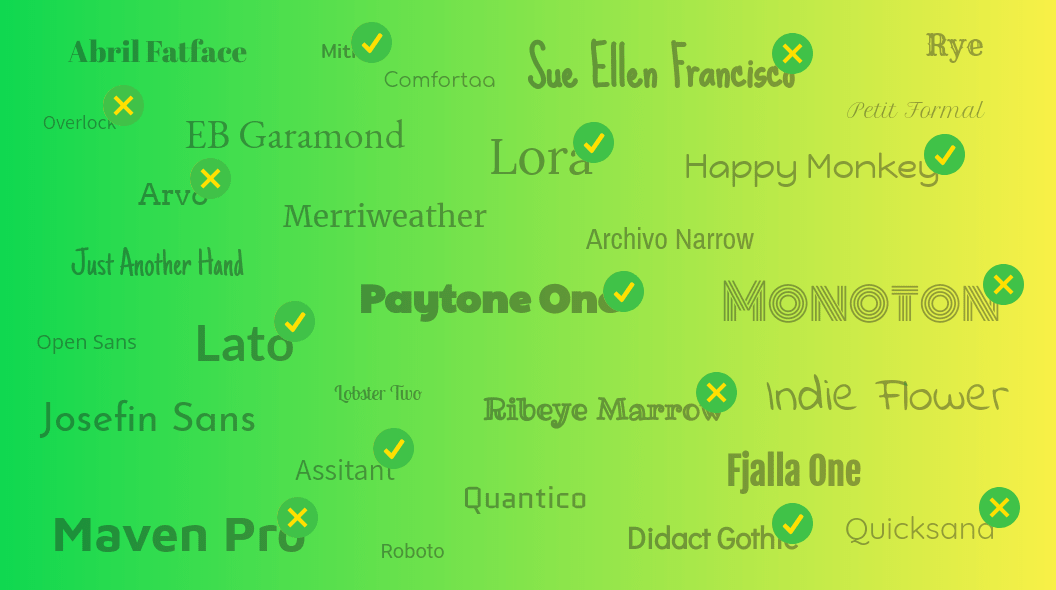
How to pick the perfect brand fonts (click the links to jump ahead to each department):
- Become to know your make personality
- Empathize the personality traits of each font category
- Know your upkeep and licensing requirements
- Pick a pair of brand fonts that matches with your brand personality
- Brand certain your brand fonts run into 3 basic requirements
Building a brand identity is non an easy task.
Your logo design , business carte design, brand messaging, make colors , and brand fonts all have to come up together to tell the story of your make.
And that story has to resonate with your audience.
No pressure.

So let'south run into if nosotros tin demystify just 1 part of that procedure: picking the perfect fonts for your make.
The perfect make fonts should:
- Be unique & memorable
- Be legible
- Work on every platform
- Communicate your brand personality
Keep reading to learn everything you need to know about picking brand fonts.
New to branding? Larn everything you need to know about branding in 3 minutes:
ane. Become to know your brand personality
Every brand identity needs a well-defined brand personality. A clear make personality will be what your customers relate with, connect to and remember you for. This can play a role in increasing your brand awareness.
All of the components of your brand–your make voice, brand color scheme , logo pattern , and make fonts–should align with and communicate your make personality.
If your brand personality isn't already well-divers, spend some time thinking about how you'd like your brand to be perceived earlier you try to find your brand fonts.
Not certain where to start? Piece of work with your stakeholders to pick 3-4 adjectives from the list below:

With your make personality in mind, you'll be ready to enter the wild earth of fonts and typography.
2. Sympathize the personality traits of each font category
If y'all're non a typography nerd, you might not be familiar with the thought of font categories. But they can exist a proficient place to kickoff your search for the perfect make fonts.
Font categories are classifications that help designers choose, pair, and place fonts.
Each category has its own unique traits (this is sometimes referred to as font psychology ), then understanding these categories is critical for finding the right fonts for your brand personality. They'll assist you narrow down your search and hone in on the right feel for your brand.
Hither are six of the basic font classifications:
- Serif
- Sans-serif
- Slab serif
- Script
- Handwritten
- Decorative

Serif fonts are classic, traditional, and trustworthy
Serif fonts are the oldest font fashion, originating mode back in the 15th century. They're named for the feet (chosen serifs) seen at the meridian and bottom of each letter.
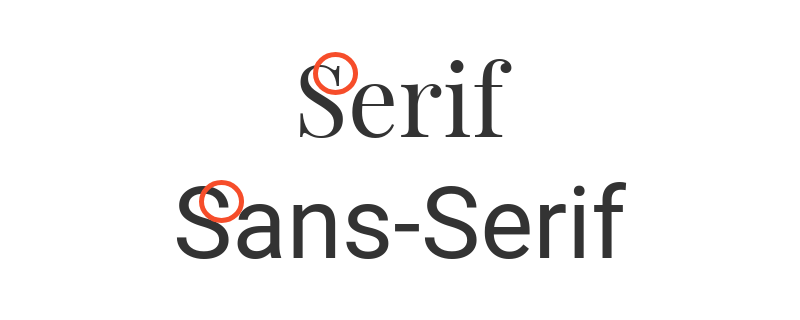
Because serif fonts are the original font mode, we by and large perceive them equally classic, traditional, and trustworthy (every bit seen in the logo pattern below):

They're favored past brands that want to convey a feeling of respectability and tradition, similar Tiffany & Co, Faddy, and Time Magazine.
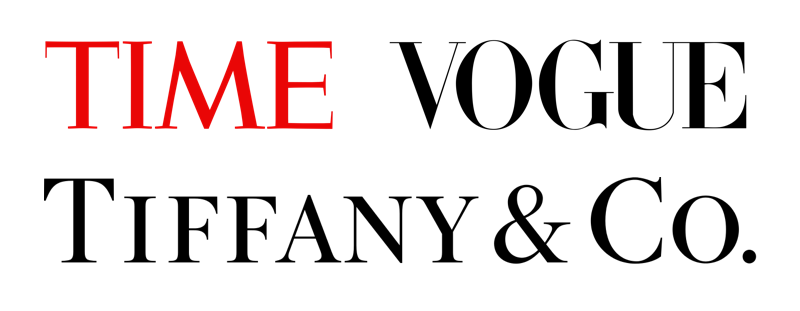
A few popular serif fonts include:
- Times New Roman
- EB Garamond
- Playfair Display
- Baskerville
- Lora
- Merriweather
Sans-serif fonts are modern, clean, and help create a minimal blueprint
Sans-serif fonts didn't emerge until the 19th century, much more recently than the traditional serif fonts, so we tend to perceive them as more modern.
Sans-serif fonts are also much simpler in class than serif fonts, and then they tend to evoke a sense of cleanliness and aid in giving y'all a minimal design, every bit seen in the logo design below.

Sans-serif fonts have taken over the spider web in recent years, with many of the top tech companies choosing bold sans-serif make fonts:

The almost common sans-serif fonts include:
- Helvetica
- Arial
- Open Sans
- Roboto
- Source Sans Pro
Slab serif fonts are bold, quirky, and confident
Slab serifs, a special breed of serif fonts, characteristic larger, blockier serifs. As a result, they look a bit more than rugged, bold, and quirky than traditional serif fonts.

This type of font works well for companies with a long and proven history of producing quality products who still want to appear current:

Some pop slab serif fonts include:
- Rockwell
- Roboto Slab
- Courier New
- Arvo
Script fonts are elegant and unique
Script fonts, elegant fonts designed to imitate cursive handwriting, have graphic symbol strokes that connect 1 letter of the alphabet to the next.
Only equally everyone'southward handwriting looks very unique, each script font feels very distinctive. They tend to follow the blueprint trends of the day, making script fonts a risky choice for a brand font, as they might autumn out of manner too quickly.
All the same, the script fonts used by brands similar Ford, Johnson & Johnson, Cadillac, and Instagram take stood the examination of time (so far).

Here are a few trendy script fonts that are popular today:
- Lucida Script
- Pacifico
- Allura
- Dancing Script
- Satisfy
Handwritten fonts are breezy and artistic
Handwritten fonts are pretty self-explanatory…they're fonts that expect like they've been written out by hand.
They sometimes incorporate weird letterforms, and they're about as unlike from traditional serif fonts as y'all can go.
They're a fun choice if y'all want to present yourself every bit a playful, breezy, approachable, or artistic brand, equally seen in this java shop logo below:

Some examples of handwritten fonts currently available on Google Fonts are:
- Knewave
- Permanent Mark
- Patrick Hand
- Amatic SC
- Just Another Hand
Decorative fonts are stylized, distinctive, and dramatic
Decorative fonts are the well-nigh various. They include any font that uses unique shapes, forms, or proportions for a highly stylized wait, such every bit graffiti fonts.
The logos of Lego, Disney, and IBM feature distinctive decorative fonts that make their brands specially memorable:

These powerful fonts are all-time used in small doses, so apply them at your own risk. They tend to be a fleck more than trendy, which yous might want to avoid if you'd like your brand to endure for years to come up.
Some fun decorative fonts include:
- Fredericka
- Fredoka 1
- Lobster Two
- Bangers
To sum upwards, here are the personality traits of the 6 pinnacle font categories:
- Serif fonts are classic, traditional, and trustworthy
- Sans-serif fonts are modernistic, clean, and aid create minimal designs
- Slab serif fonts are bold, quirky, and confident
- Script fonts are elegant and unique
- Handwritten fonts are informal and artistic
- Decorative fonts are stylized, distinctive, and dramatic

Learn more about font personalities in our guide: How to selection fonts that make (not break) your infographic .
iii. Know your upkeep and licensing requirements
Before you go serious about picking your brand fonts, y'all should think near how you're going to source your fonts.
Some font libraries offering free, open-source fonts, including:
- Google Fonts
- Font Squirrel
- Font Library
Y'all tin can observe a curated list of free fonts in Venngage'southward editor, making it the perfect playground for testing out brand fonts:
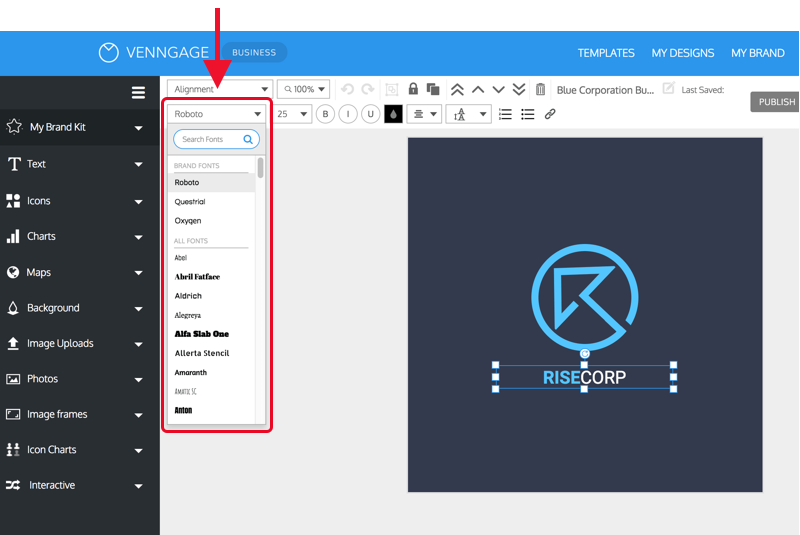
While user-friendly, gratis font libraries tend to offer a limited selection of fonts, and these fonts might just come in a few different styles (like bold or italic ). It might be hard to find font families with a range of different font weights and styles (similar lite, regular, semibold, bold, and more than).
Other font libraries offering paid font licenses, including:
- Adobe Fonts (previously Typekit)
- Linotype
- Fonts.com
These libraries can give you admission to many more options, but they can get expensive. Most paid font libraries will charge individual fees for each type of font license. So if you lot want to utilize your new font on the web, in a mobile app, and for print materials, y'all'll probably take to pay for three split font licenses.
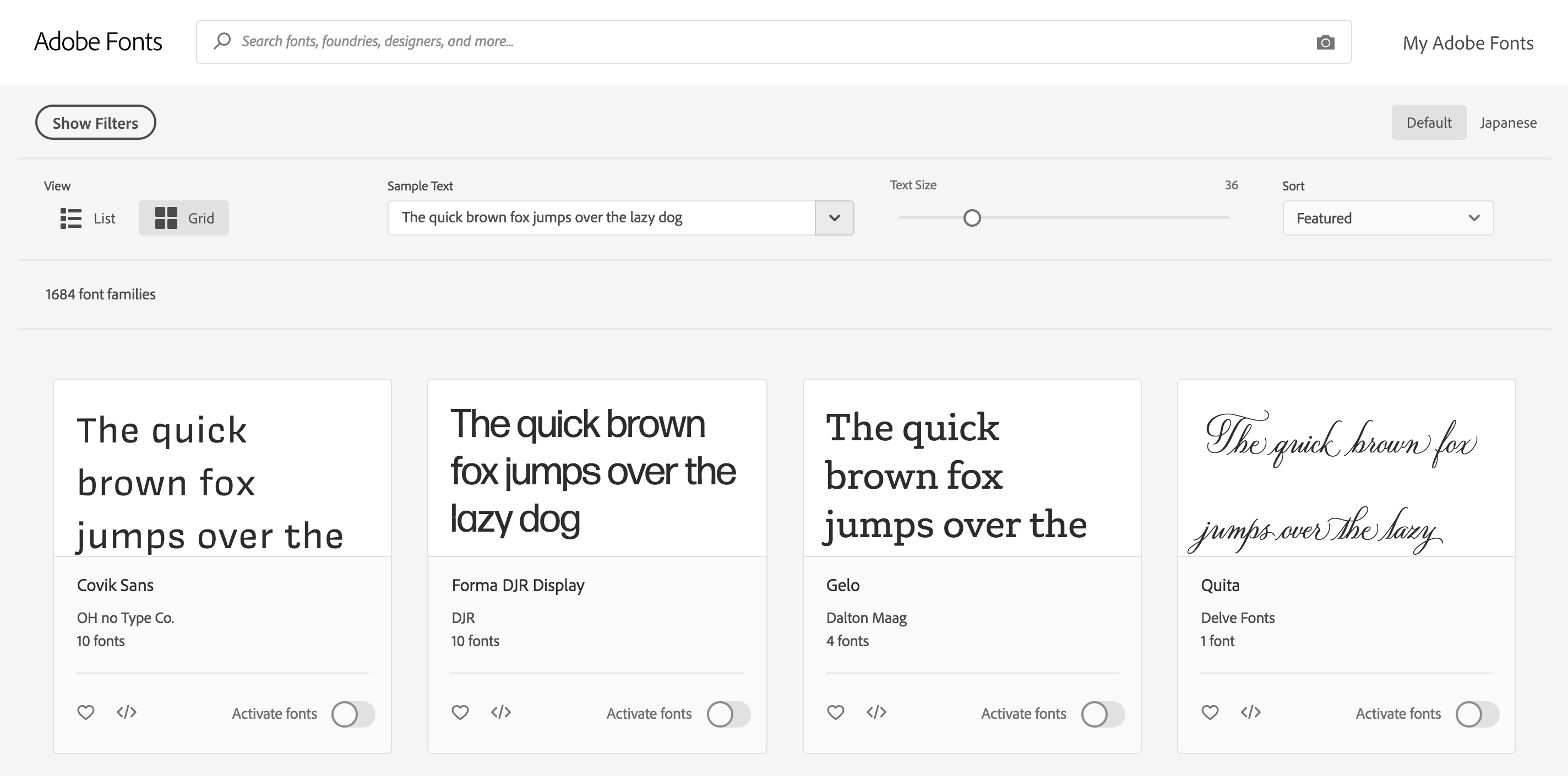
Whether you go for free or paid fonts is up to you, merely when making your decision, consider where your make fonts are going to exist used.
4. Pick a pair of make fonts that match with your make personality
Once you lot're familiar with your brand personality and y'all've got a handle on the different font categories, you should be ready to try out some fonts for your brand (with your business plan and marketing programme in heed).
But the font categories nosotros reviewed above don't really tell the whole story when it comes to font personalities.
There's a ton of style variation inside each category that impacts the vibe of each font, and how you pair the fonts plays a huge office, likewise.
So let's look at some font pairing schemes that piece of work for different make personalities.
Pair a bold serif header with a nondescript sans-serif subheader for an approachable yet trustworthy feel
The dissimilarity between serif and sans-serif styles makes them a natural pairing, allowing you to residuum the modern traits of the sans-serif font with the trustworthy vibe of the serif font.

Some balanced serif/sans-serif pairings include:
- Abril Fatface (header), Montserrat (subheader)
- Rozha 1 (header), Raleway (subheader)
- Abril Fatface (header), Quicksand (subheader)
Use a single, minimal sans-serif font for a modern, professional, corporate look
You can endeavour pairing a bold version of a mod sans-serif font with a regular version of the same font for a wait that's sleek and professional.
You can't really go wrong when you're pairing a font with itself, and then it's a prophylactic approach if you're not confident in your typography skills.

Some minimal blueprint sans-serif font pairing options include:
- Economica Bold (header), Economica Regular (subheader)
- Montserrat Regular (header), Montserrat Bold (subheader)
- Source Sans Pro Bold (header), Source Sans Pro Regular (subheader)
Use thin, stylized, sans-serif fonts for a loftier-end, elegant feel
According to font psychology researcher Sarah Hyndman, thinner, lighter weight fonts are consistently rated as looking more expensive than heavier, more rounded fonts.
Equally in the example beneath, you tin can create a frail, loftier-end look past mixing a thin sans-serif header with a light serif subheader:

Then if you're looking for elegant fonts , stick lite, thin fonts, like:
- Julius Sans 1
- Playfair Display
- Poiret I
- Verdana
Use thick, rounded sans-serif fonts for a youthful, friendly feel
Thick, rounded sans-serifs accept the opposite effect to thin, lightweight fonts–they appear playful, affordable, and youthful.
Equally seen in the logo design below, they match well with kid-focused, inclusive businesses like daycares or restaurants:

For this friendly, low-price feel, employ thicker, rounded font pairings like:
- Quicksand Bold (header), Open Sans (subheader)
- Fredoka One (header), Montserrat (subheader)
- Quicksand Bold (header), Quicksand Regular (subheader)
Employ a single traditional serif font for a conservative, trustworthy experience
Similar to the way nosotros paired a assuming version with a regular version of the same sans-serif font, another foolproof method for pairing fonts is to vary the capitalization of the font.
Nosotros tin pair an all-caps version of a serif font with itself for a await that'south neutral, conventional, and reliable (similar the not-profit logo below).

Serif fonts that work well for traditional businesses include:
- EB Garamond
- Playfair Display
- Baskerville
- Wire One
To review, here are some brand font pairing options for unlike brand personalities:
- Pair a bold serif header with a nondescript sans-serif subheader for an approachable yet trustworthy feel
- Use a unmarried, minimal sans-serif font for a modern, professional, corporate look
- Use thin, stylized, sans-serif fonts for a loftier-end, elegant feel
- Employ thick, rounded sans-serif fonts for a youthful, friendly feel
- Use a single traditional serif font for a conservative, trustworthy feel
5. Make sure your brand fonts meet 3 basic requirements
After you've chosen one or two make fonts that marshal with your brand personality, at that place are a few final checks y'all should do before pitching them to your client or manager.
Brand fonts must be flexible
Considering you're probably going to exist stuck with these fonts for years to come, you'll need to make sure your brand fonts piece of work well for every medium (including print, spider web, and mobile).
Make sure you lot accept the proper licenses for each awarding, and if you plan to use your brand fonts on your product packaging design, your blog, in external presentations and in static social media images , make certain you mock upwardly designs for each.

Brand fonts should have multiple font weights
Multiple font weights (i.e. light, regular, semibold, and bold) are critical for building a clear text hierarchy, which should be specified in your brand fashion guide, like the one below.
You'll need to utilise the unlike font weights to differentiate between headers, subheaders, torso text, callouts, and quotes in both print and online media.

Brand fonts must exist legible
Finally, brand fonts must be legible. Information technology should be easy to read and understand any text styled in your brand fonts…upper-case letter or lowercase, large or pocket-size, numbers or letters.
The brand font that yous use for headers doesn't have to be quite equally legible as the font you apply for trunk re-create, but nonetheless, it should be easy to read at a glance.
Conclusion
Much like any other make design challenge, picking brand colors is all most finding fonts that match your make personality (and making sure they'll work for anything y'all throw at them).
More than brand design resources from Venngage:
Everything You lot Need To Know About Picking and Using Make Colors
How To Create a Brand Manner Guide
x Like shooting fish in a barrel Logo Design Tips to Accept Your Make to the Next Level
How To Use "My Brand Kit" To Brand Your Designs & Save Time
Source: https://venngage.com/blog/brand-fonts/
0 Response to "Best Fonts That an Art Business Should Use Consistently"
Post a Comment